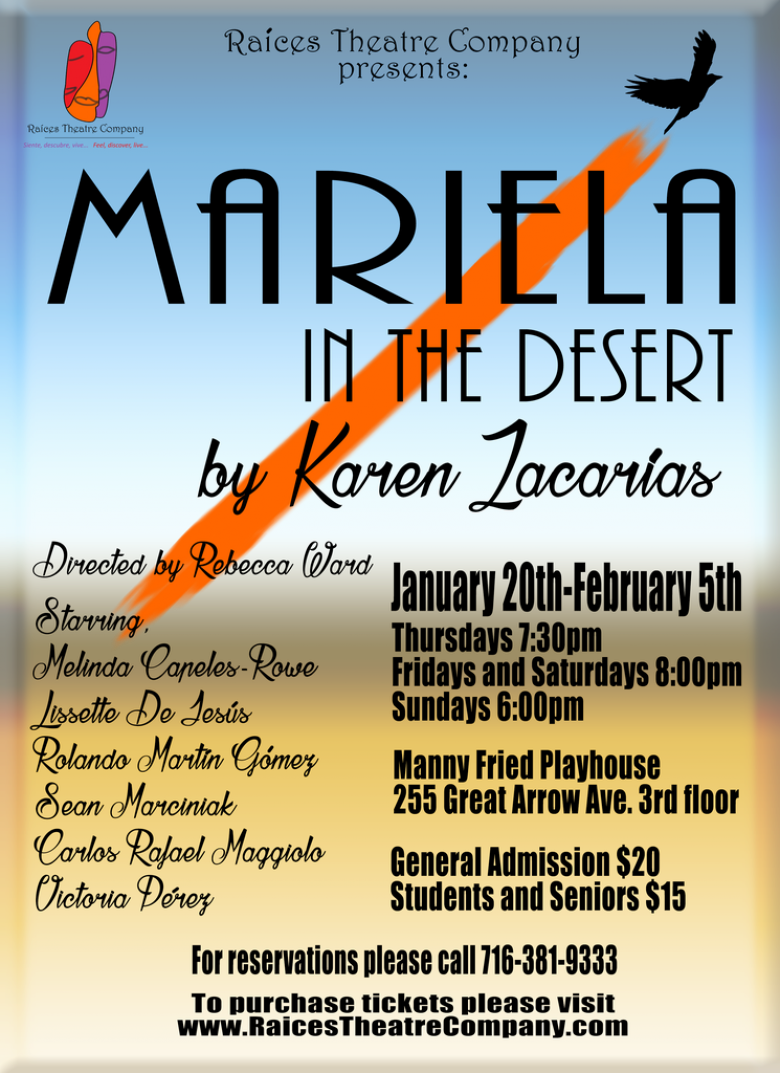The set for “Mariela in the Desert” is surrounded by a series of rectangular and square boxes set up like a very low fence. They’re almost colorless – a very light sandy beige. In this play with art as a central theme, the lack of color speaks to the emptiness of failed, but almost-famous or could-have-been-famous artists. As the play unfolds, the structure gives a sense of the characters being boxed in, or imprisoned. A large screen on the back wall of the stage uses Mexican Expressionist paintings as backdrops to the set, and then comes alive as the canvas when a character is painting, very effective use of the backdrop.
This Raices Theatre Company play is about art and family and love and unbridled selfishness and ego and sacrifice. What does it profit a man when he pursues art to the detriment of his entire family, including himself? What does it profit a woman when she sacrifices herself and her art for the sake of that man’s pursuit? These are people who have made choices they can scarcely bear to endure.
As the play opens, the long-suffering Mariela (Victoria Perez) tends to her husband, the dying José (Rolando Martin Gomez). In a flashback scene, we see José and Mariela as part of the community of revolutionary Mexican Expressionist artists in Mexico City in the 1940s. They’re friends with Rivera, Kahlo, and Orozco among others, but not quite at their level. Mariela is younger than the others, and is just spreading her wings as an artist. José is envious of Rivera, and wants to move his young family to a ranch far out in the desert to set up a space where artists can meet and paint and talk, and where he will be the center of it all. “The desert is God’s canvas,” he says, and will inspire him and other artists to greatness. In a very poignant scene, he convinces (read: bullies) Mariela to pose naked for Rivera, but refuses her request to ask Rivera to pose naked for her. She then acquiesces to his desire to move to the desert.
The play takes place in 1951, years after the move. Mariela and José live with his spinster sister, Oliva (Melinda Capeles-Rowe). Their son, Carlos (Carlos Rafael Maggiolo) died some years earlier, and their daughter, Blanca (Lissette DeJesus) is a student in Mexico City. What has happened to this family in the years between their move to the desert and the present, and what transpires when 21-year-old Blanca returns with Adam (Sean Marciniak), her older lover who is an American Art History professor, fill out the rest of the play.
There is a great deal of dialogue about art and artists. Why do we create art? What is art? Is the basis of art truth, or beauty, or both? And, very importantly, through art can one transcend the suffering in life? Adam questions whether abstract expressionism is true art. Mariela constantly paints in her mind, but never on a canvas. José rants and raves about art, but doesn’t paint at all any more. Art becomes a character in the play that Mariela, José, and Blanca love and hate and wrestle with throughout their lives.
Victoria Perez brings a mother’s love, a wife’s disillusion, a dry wit, and an artist’s sensibility to her role as Mariela. She laughs and cries and drinks and fights with gusto. After years in the desert, she no longer acquiesces. Rolando Martin Gomez blusters, demands, whines, and rages as the egocentric José. While he seemed to be reaching for lines occasionally, he is a very commanding figure on the stage as the rageful, disappointed and dying José. Melinda Capeles-Rowe is very funny as the superstitious spinster Oliva, whose stage business at times is a distraction rather than an enhancement of a scene. But, she is mostly terrific comic relief. Lissette DeJesus as Blanca is best in her confrontations with Mariela, standing up to her and telling her mother her truth. Sean Marciniak as Adam exhibits a knowledge and love of art in a kind of bland American way that is counterpoint to the passion of Mariela and José. Carlos Rafael Maggiolo as the little autistic son embodies the pain in this family, as he rocks himself and bangs his head on the floor when frightened.
As the play flashes back to the past and returns to the present, the secrets of this family gradually unfold in surprising ways. The audience is drawn more and more into the life of Mariela in the Desert, a woman and a play that have much to say to us about art and family and survival.
By the Raices Theatre Company. Performances from January 20 through February 5, 2017.
Mariela in the Desert
Fri Jan 20th → Sun Feb 5th
Days: Sun, Thu, Fri, Sat

